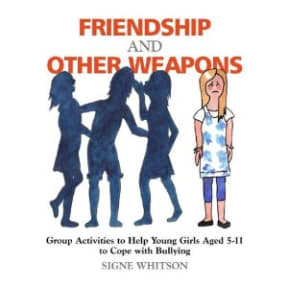"Sorry, you're not invited." "Why are you wearing THAT skirt?" "This seat's taken."
It's a more subtle form of bullying, but one that can leave children isolated and miserable. And it can be hard for parents and teachers to recognise because it is often disguised as friendship.

Friendship and Other Weapons by Signe Whitson Photo: Signe Whitson
Child and Adolescent Therapist Signe Whitson has spent two decades working in the field of bullying prevention. Her book Friendship & Other Weapons delves into what constitutes girl bullying and how parents and teachers can recognise it and help children deal with it.
She says the most common bullying behaviors include:
1. Excluding girls from parties and play dates
2. Talking about parties and play dates in front of girls who are not invited
3. Mocking, teasing, and calling girls names
4. Giving girls the "silent treatment"
5. Threatening to take away friendship ("I won't be your friend anymore if...")
6. Encouraging others to "gang up" on a girl you are angry with
7. Spreading rumors and starting gossip about a girl
8. "Forgetting" to save a seat for a friend or leaving a girl out by "saving a seat" for someone else
9. Saying something mean and then following it with "just joking" to try to avoid blame
10. Using cell phones and/or social media to gossip, start rumors, say mean things, or forward embarrassing posts and photos
Ms Whitson said because it could be so subtle, and based around crimes of omission, it was often very hard for girls to put their finger on what they were experiencing.
So when should parents step in? In a piece she wrote for the Huffington Post last month, Ms Whitson outlined the best ways parents can help.
The line between helicopter and hands-off can get confusing, as adults waver between wanting to protect young people from the pain of broken friendships and believing that bullying is an inevitable rite of passage. The bottom line is this: no child should have to find her way through painful conflict alone.... Adults play a critical role in keeping an open dialogue with young people and making them aware of the typical behaviors that mark this cruel form of social aggression.
She said one of the key things parents could teach girls was to not suppress their anger. She said many girls were taught from an early age that anger was bad, which made it very difficult for them to stand up to bullying.
She talks to Kathryn Ryan on Nine to Noon about girl bullying: how to recognise it and how to deal with it.

